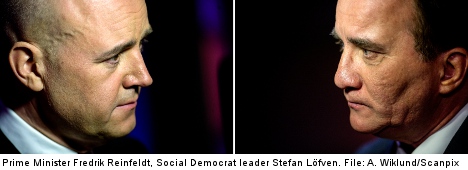Jobs, taxes, and schools were the main themes of Sunday night’s debate, broadcast live on Sveriges Television (SVT). The first half of the debate held the majority of the action, in what the Dagens Nyheter newspaper called “the most heated debate in several years”.
Prime Minister Reinfeldt opened the debate by referring to his government’s plans for a fifth round of income-tax reductions, stating that “if people get to keep more of their salary, then the will and the drive to work will be higher”.
Löfven, who placed unemployment levels highest up his agenda, was unimpressed.
“I hate unemployment,” he said. “I will ensure that every council of state and every authority head gets asked about how they can contribute (to creating more jobs,” he responded.
Reinfeldt, whose four-party centre-right coalition is hoping for a third election victory in September 2014, responded that unemployment isn’t his biggest concern.
“I learned to hate something even worse, that is being an outsider,” he said, adding that such people are often neglected.
Löfven didn’t let the unemployment issue drop, however.
“We have a higher unemployment level than when you took office. You can’t escape that,” he replied.
Next on the agenda was taxes, with Löfven explaining that his party believed it was “fair” to lower taxes for pensioners, stating that “our simple argument is that pension is deferred pay”
Reinfeldt countered by calling Löfven’s tax policies a mess.
“Stefan Löfven is against all tax cuts until they are applied. But you’ll never lower taxes for ordinary people,” he said.
Löfven countered by accusing the PM of lowering taxes with “borrowed money” – a reference to the government’s recently unveiled autumn budget, which caused raised eyebrows also in the country’s conservative press.
Another hot topic was schooling. Education Minister Jan Björklund, taking part in the debate as the leader of The Liberals (Folkpartiet), claimed that school results had continually dropped for 20 years because of the mess from the last Social Democrat government’s actions still being cleaned up.
Löfven retorted that perhaps the statistics had something to do with the fact that Björklund had been the longest sitting education minister in Sweden since primary education (grundskola) was introduced in 1962.
At the close, the prime minister and the leader of the opposition were pleased with their respective efforts in the debate.
“This was a truly good debate, it was the beginning of a long election year where we are going to show that we are focusing on growth, which will get the economy to grow,” Reinfeldt told reporters after.
Swedes will go to the polls on September 14th, 2014.
TT/The Local/og




 Please whitelist us to continue reading.
Please whitelist us to continue reading.
Member comments